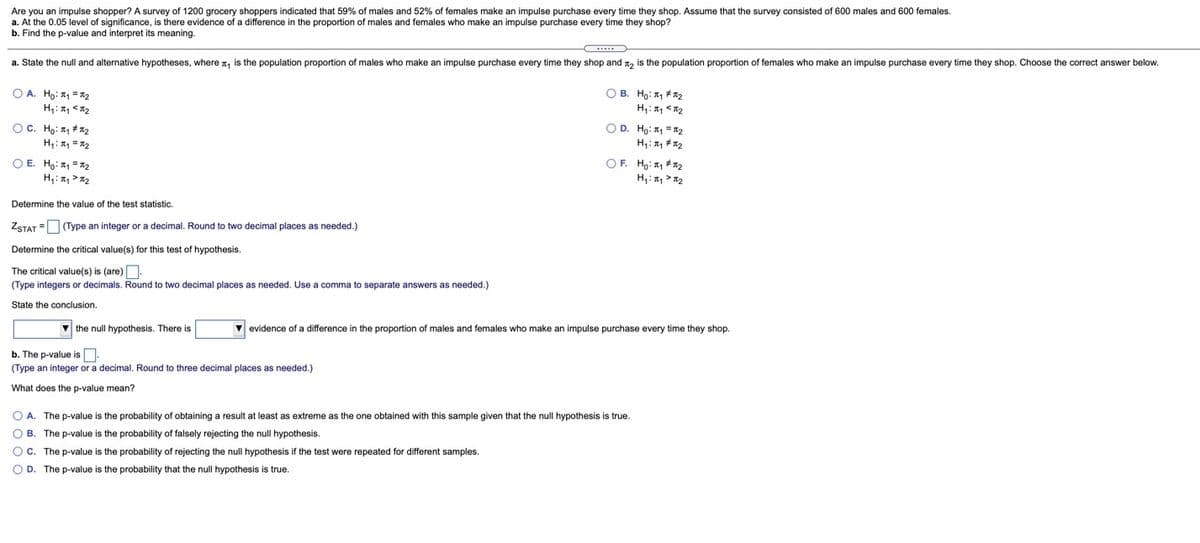Are you an impulse shopper? A survey of 1200 grocery shoppers indicated that 59% of males and 52% of females make an impulse purchase every time they shop. Assume that the survey consisted of 600 males and 600 females. a. At the 0.05 level of significance, is there evidence of a difference in the proportion of males and females who make an impulse purchase every time they shop? b. Find the p-value and interpret its meaning.
Are you an impulse shopper? A survey of 1200 grocery shoppers indicated that 59% of males and 52% of females make an impulse purchase every time they shop. Assume that the survey consisted of 600 males and 600 females. a. At the 0.05 level of significance, is there evidence of a difference in the proportion of males and females who make an impulse purchase every time they shop? b. Find the p-value and interpret its meaning.
Glencoe Algebra 1, Student Edition, 9780079039897, 0079039898, 2018
18th Edition
ISBN:9780079039897
Author:Carter
Publisher:Carter
Chapter10: Statistics
Section10.4: Distributions Of Data
Problem 19PFA
Related questions
Question
100%

Transcribed Image Text:Are you an impulse shopper? A survey of 1200 grocery shoppers indicated that 59% of males and 52% of females make an impulse purchase every time they shop. Assume that the survey consisted of 600 males and 600 females.
a. At the 0.05 level of significance, is there evidence of a difference in the proportion of males and females who make an impulse purchase every time they shop?
b. Find the p-value and interpret its meaning.
a. State the null and alternative hypotheses, where n, is the population proportion of males who make an impulse purchase every time they shop and n, is the population proportion of females who make an impulse purchase every time they shop. Choose the correct answer below.
O A. Ho: 1 =x2
O B. Ho: T1 #2
H,:, <12
OC. Ho: 1 + n2
OD. Ho: 1 = 2
O E. Ho: 1 =x2
H,: > 12
OF. Hg: #72
H,:, > 12
Determine the value of the test statistic.
ZSTAT =O (Type an integer or a decimal. Round to two decimal places as needed.)
Determine the critical value(s) for this test of hypothesis.
The critical value(s) is (are).
(Type integers or decimals. Round to two decimal places as needed. Use a comma
separate answers as needed.)
State the conclusion.
V the null hypothesis. There is
v evidence of a difference in the proportion of males and females who make an impulse purchase every time they shop.
b. The p-value is.
(Type an integer or a decimal. Round to three decimal places as needed.)
What does the p-value mean?
O A. The p-value is the probability of obtaining a result at least as extreme as the one obtained with this sample given that the null hypothesis is true.
O B. The p-value is the probability of falsely rejecting the null hypothesis.
O c. The p-value is the probability of rejecting the null hypothesis if the test were repeated for different samples.
O D. The p-value is the probability that the null hypothesis is true.
Expert Solution
This question has been solved!
Explore an expertly crafted, step-by-step solution for a thorough understanding of key concepts.
This is a popular solution!
Trending now
This is a popular solution!
Step by step
Solved in 2 steps with 1 images

Recommended textbooks for you

Glencoe Algebra 1, Student Edition, 9780079039897…
Algebra
ISBN:
9780079039897
Author:
Carter
Publisher:
McGraw Hill

Holt Mcdougal Larson Pre-algebra: Student Edition…
Algebra
ISBN:
9780547587776
Author:
HOLT MCDOUGAL
Publisher:
HOLT MCDOUGAL

Glencoe Algebra 1, Student Edition, 9780079039897…
Algebra
ISBN:
9780079039897
Author:
Carter
Publisher:
McGraw Hill

Holt Mcdougal Larson Pre-algebra: Student Edition…
Algebra
ISBN:
9780547587776
Author:
HOLT MCDOUGAL
Publisher:
HOLT MCDOUGAL